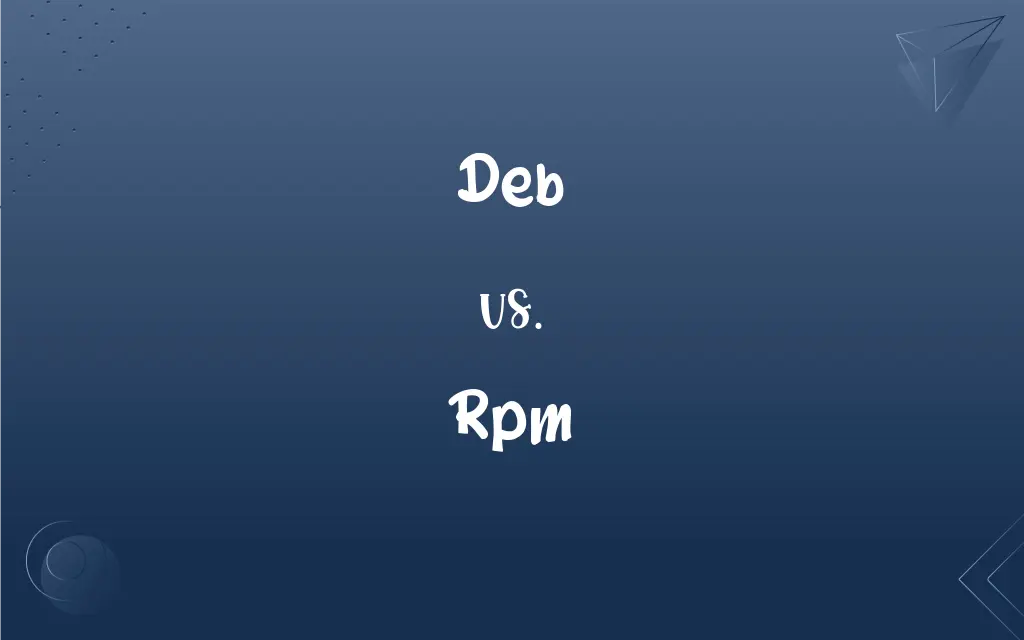DEB vs. RPM: What's the Difference?
Edited by Aimie Carlson || By Harlon Moss || Updated on June 5, 2024
"Deb" and "rpm" are packaging formats used in different Linux distributions, with ".deb" for Debian-based systems and ".rpm" for Red Hat-based systems, both serving to manage, install, and track system software.

Key Differences
"Deb" is a format and a software package installation file used in Debian and its derivatives like Ubuntu. It stands for "Debian package" and is utilized to install software on Debian and Debian-based systems. In contrast, "rpm," which stands for "Red Hat Package Manager," is a package management system that is used by Red Hat and its derivatives like Fedora. Both “deb” and “rpm” essentially serve as the tools and formats used to manage and organize software on different Linux distributions.
"Deb" uses dpkg (Debian package management system) as the basic tool to install and manage packages. Using dpkg, users can install, update, and remove software from their systems. On the other hand, "rpm" uses the RPM Package Manager system to manage software on a system. Although both deb and rpm serve the same fundamental purposes, they are not interchangeable due to the underlying differences in the systems they operate within and the management tools they employ.
The "deb" system utilizes apt or apt-get as a high-level package management tool that works on top of dpkg, simplifying the software management process for the user by handling dependencies and offering an easier interface. In contrast, "rpm" systems often use yum or dnf as high-level management tools, which similarly abstract some of the complexity away from the user, providing easier software management, and ensuring dependencies are respected. Both management tools offer convenience, but with variations in commands and usage syntax.
While "deb" packages are typically used in distributions derived from the Debian operating system, such as Ubuntu, Mint, and others, "rpm" packages find their usage primarily in Red Hat distributions and those based upon it, such as Fedora and CentOS. Each packaging system is integral to the software management capability of their respective distributions, yet neither is universally adaptable to all Linux systems.
The underlying structure and function of "deb" and "rpm" packages also exhibit differences. The "deb" package consists of two tar archives, one for the installable data and the other for control information. Conversely, "rpm" packages utilize cpio archives for the packaged data. Thus, despite both being software packages, their internal structures and the way they store data are disparate, reflecting their adaptation to their respective distributions.
ADVERTISEMENT
Comparison Chart
Primary Use
Debian-based distributions
Red Hat-based distributions
Common Tools
Dpkg, apt
Rpm, yum, dnf
Key Distributions
Debian, Ubuntu
Red Hat, Fedora, CentOS
Package Management
Advanced Package Tool (APT)
RPM Package Manager
Dependency Handling
Strong dependency resolution via APT
Robust dependency management with YUM/DNF
ADVERTISEMENT
Compatibility
Tailored for Debian systems
Tailored for Red Hat systems
DEB and RPM Definitions
Deb
A package format for Debian-based systems.
Ubuntu uses the deb package format for software installation.
Rpm
Managed using the rpm tool and higher-level managers like yum.
You can use yum to manage rpm packages in Fedora.
Deb
Managed by the dpkg package manager.
Use dpkg to install the deb package on your system.
Rpm
A format using cpio archives for internal data storage.
The rpm format stores its files in a cpio archive.
Deb
A format utilizing two tar archives internally.
The deb package contains control and data tar archives.
Rpm
Utilized in various Linux distributions, including CentOS.
CentOS, like Red Hat, uses rpm for package management.
Deb
An archive containing installable software and metadata.
I downloaded the deb file to install the latest version of the software.
Rpm
A package manager and format for Red Hat distributions.
Red Hat and Fedora utilize rpm for software management.
Deb
Associated with apt as a high-level management tool.
To install a deb package, you can use apt-get install command.
Rpm
A file that can install, upgrade, or query software on a system.
Use rpm commands to install software from an rpm package.
Deb
A debutante.
Rpm
Alternative case form of RPM
Deb
(informal) debutante
Rpm
Alternative case form of RPM
Deb
(informal) Debutante ball or debut.
Rpm
Rate of revolution of a motor;
The engine was doing 6000 revs
Deb
A young woman making her debut into society
FAQs
What does "deb" stand for?
"Deb" stands for "Debian package."
Which Linux distributions primarily use "deb" packages?
Debian and its derivatives, like Ubuntu and Mint, primarily use "deb" packages.
Which Linux distributions primarily use "rpm" packages?
Red Hat and its derivatives, like Fedora and CentOS, primarily use "rpm" packages.
What high-level tool is commonly used for "rpm" packages?
Yum or dnf is commonly used as a high-level tool for "rpm" packages.
What internal archive format does "deb" use?
"Deb" uses two tar archives internally.
Can I create my own "deb" packages?
Yes, with the correct tools and knowledge, users can create their own "deb" packages.
What is the basic tool for managing "rpm" packages?
The "rpm" command/tool is used for managing "rpm" packages.
Is "deb" specific to Debian-based distributions?
Yes, "deb" is designed for Debian and its derivative distributions.
Are "deb" and "rpm" packages source or binary?
Both "deb" and "rpm" are binary package formats but can also distribute source files.
What is the basic tool for managing "deb" packages?
Dpkg is the basic tool for managing "deb" packages.
What high-level tool is commonly used for "deb" packages?
Apt or apt-get is commonly used as a high-level tool for "deb" packages.
Can "deb" packages be installed on "rpm" based systems and vice versa?
While not standard, there are tools like "alien" that can convert and install "deb" and "rpm" packages on opposing systems.
Is "rpm" specific to Red Hat-based distributions?
Yes, "rpm" is designed for Red Hat and its derivative distributions.
Can I create my own "rpm" packages?
Yes, with the appropriate tools and knowledge, users can create their own "rpm" packages.
What internal archive format does "rpm" use?
"Rpm" uses cpio archives internally.
What file extension is used for "deb" packages?
".deb" is the file extension used for "deb" packages.
What file extension is used for "rpm" packages?
".rpm" is the file extension used for "rpm" packages.
What does "rpm" stand for?
"Rpm" stands for "Red Hat Package Manager."
Can "deb" manage dependencies automatically?
Yes, with the high-level tool apt, "deb" can manage dependencies automatically.
Can "rpm" manage dependencies automatically?
Yes, with the high-level tool yum or dnf, "rpm" can manage dependencies automatically.
About Author
Written by
Harlon MossHarlon is a seasoned quality moderator and accomplished content writer for Difference Wiki. An alumnus of the prestigious University of California, he earned his degree in Computer Science. Leveraging his academic background, Harlon brings a meticulous and informed perspective to his work, ensuring content accuracy and excellence.
Edited by
Aimie CarlsonAimie Carlson, holding a master's degree in English literature, is a fervent English language enthusiast. She lends her writing talents to Difference Wiki, a prominent website that specializes in comparisons, offering readers insightful analyses that both captivate and inform.































































